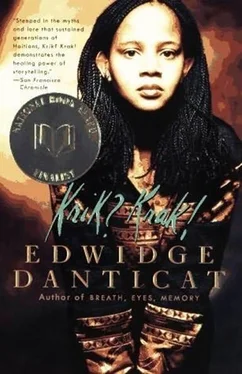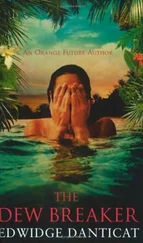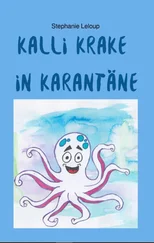Célianne's fingernails are buried deep in the child's naked back. The old man with the pipe just asked, "Kompè, what are you writing?" I told him, "My will."

i am getting used to ville rose, there are butterflies here, tons of butterflies, so far none has landed on my hand, which means they have no news for me. i cannot always bathe in the stream near the house because the water is freezing cold, the only time it feels just right is at noon, and then there are a dozen eyes who might see me bathing, i solved that by getting a bucket of water in the morning and leaving it in the sun and then bathing myself once it is night under the banyan tree, the banyan now is my most trusted friend, they say banyans can last hundreds of years, even the branches that lean down from them become like trees themselves, a banyan could become a forest, manman says, if it were given a chance, from the spot where i stand under the banyan, i see the mountains, and behind those are more mountains still, so many mountains that are bare like rocks, i feel like all those mountains are pushing me farther and farther away from you.

She threw it overboard. I watched her face knot up like a thread, and then she let go. It fell in a splash, floated for a while, and then sank. And quickly after that she jumped in too. And just as the baby's head sank, so did hers. They went together like two bottles beneath a waterfall. The shock lasts only so long. There was no time to even try and save her. There was no question of it. The sea in that spot is like the sharks that live there. It has no mercy.
They say I have to throw my notebook out. The old man has to throw out his hat and his pipe. The water is rising again and they are scooping it out. I asked for a few seconds to write this last page and then promised that I would let it go. I know you will probably never see this, but it was nice imagining that I had you here to talk to.
I hope my parents are alive. I asked the old man to tell them what happened to me, if he makes it anywhere. He asked me to write his name in "my book." I asked him for his full name. It is Justin Moi'se Andre Nozius Joseph Frank Osnac Maximilien. He says it all with such an air that you would think him a king. The old man says, "I know a Coast Guard ship is coming. It came to me in my dream." He points to a spot far into the distance. I look where he is pointing. I see nothing. From here, ships must be like a mirage in the desert.
I must throw my book out now. It goes down to them, Célianne and her daughter and all those children of the sea who might soon be claiming me.
I go to them now as though it was always meant to be, as though the very day that my mother birthed me, she had chosen me to live life eternal, among the children of the deep blue sea, those who have escaped the chains of slavery to form a world beneath the heavens and the blood-drenched earth where you live.
Perhaps I was chosen from the beginning of time to live there with Agwé at the bottom of the sea. Maybe this is why I dreamed of the starfish and the mermaids having the Catholic Mass under the sea. Maybe this was my invitation to go. In any case, I know that my memory of you will live even there as I too become a child of the sea.

today i said thank you. i said thank you, papa, because you saved my life, he groaned and just touched my shoulder, moving his hand quickly away like a butterfly, and then there it was, the black butterfly floating around us. i began to run and run so it wouldn't land on me, but it had already carried its news, i know what must have happened, tonight i listened to manman's transistor under the banyan tree, all i hear from the radio is more killing in port-au-prince. the pigs are refusing to let up. i don't know what's going to happen, but i cannot see staying here forever, i am writing to you from the bottom of the banyan tree, manman says that banyan trees are holy and sometimes if we call the gods from beneath them, they will hear our voices clearer, now there are always butterflies around me, black ones that i refuse to let find my hand, i throw big rocks at them, but they are always too fast, last night on the radio, i heard that another boat sank off the coast of the bahamas. i can't think about you being in there in the waves, my hair shivers, from here, i cannot even see the sea. behind these mountains are more mountains and more black butterflies still and a sea that is endless like my love for you.
My Madonna cried. A miniature teardrop traveled down her white porcelain face, like dew on the tip of early morning grass. When I saw the tear I thought, surely, that my mother had died.
I sat motionless observing the Madonna the whole day. It did not shed another tear. I remained in the rocking chair until it was nightfall, my bones aching from the thought of another trip to the prison in Port-au-Prince. But, of course, I had to go.
The roads to the city were covered with sharp pebbles only half buried in the thick dust. I chose to go barefoot, as my mother had always done on her visits to the Massacre River, the river separating Haiti from the Spanish-speaking country that she had never allowed me to name because I had been born on the night that El Generalissimo, Dios Trujillo, the honorable chief of state, had ordered the massacre of all Haitians living there.
The sun was just rising when I got to the capital. The first city person I saw was an old woman carrying ajar full of leeches. Her gaze was glued to the Madonna tucked under my arm.
"May I see it?" she asked.
I held out the small statue that had been owned by my family ever since it was given to my great-great-great-grandmother Defile by a French man who had kept her as a slave.
The old woman's index finger trembled as it moved toward the Madonna's head. She closed her eyes at the moment of contact, her wrists shaking.
"Where are you from?" she asked. She had layers of 'respectable' wrinkles on her face, the kind my mother might also have one day, if she has a chance to survive.
"I am from Ville Rose," I said, "the city of painters and poets, the coffee city, with beaches where the sand is either black or white, but never mixed together, where the fields are endless and sometimes the cows are yellow like cornmeal."
The woman put the jar of leeches under her arm to keep them out of the sun.
"You're here to see a prisoner?" she asked.
"Yes."
"I know where you can buy some very good food for this person."
She led me by the hand to a small alley where a girl was selling fried pork and plantains wrapped in brown paper. I bought some meat for my mother after asking the cook to fry it once more and then sprinkle it with spiced cabbage.
The yellow prison building was like a fort, as large and strong as in the days when it was used by the American marines who had built it. The Americans taught us how to build prisons. By the end of the 1915 occupation, the police in the city really knew how to hold human beings trapped in cages, even women like Manman who was accused of having wings of flame.
The prison yard was as quiet as a cave when a young Haitian guard escorted me there to wait. The smell of the fried pork mixed with that of urine and excrement was almost unbearable. I sat on a pile of bricks, trying to keep the Madonna from sliding through my fingers. I dug my buttocks farther into the bricks, hoping perhaps that my body might sink down to the ground and disappear before my mother emerged as a ghost to greet me.
Читать дальше















